What's Happening?
The cruise industry is experiencing a paradoxical situation as it enters the 2025-26 Wave Season. According to Joel Katz, Managing Director of Cruise Line Industry Association Australasia, the sector is witnessing strong demand and significant investments in new ships, with over $100 billion allocated for new tonnage. However, the industry faces challenges related to fuel supply, infrastructure, and regulatory coordination. The Federal Government's biofuels announcement is seen as timely, aligning with the International Maritime Organization's Net-Zero Framework aiming for net-zero greenhouse gas emissions by 2050. Despite these efforts, the supply and cost of alternative fuels remain major obstacles. Additionally, shore power development is progressing slowly, with Australia lagging behind Europe in implementing shore power at ports.
Why It's Important?
The developments in the cruise industry have significant implications for the U.S. market and global tourism. The strong demand and investment in new ships indicate confidence in the industry's growth potential, which could lead to increased economic activity and job creation. However, the sustainability challenges highlight the need for coordinated policy efforts to ensure environmental goals are met. The focus on biofuels and shore power reflects broader trends in the maritime sector towards reducing emissions, which could influence regulatory frameworks and investment strategies in the U.S. and other regions. The industry's commitment to sustainability is crucial for maintaining its long-term viability and addressing environmental concerns.
What's Next?
The cruise industry is expected to continue investing in new technologies and infrastructure to meet sustainability targets. The development of alternative fuels and shore power capabilities will be critical in achieving net-zero emissions by 2050. Stakeholders, including governments and port authorities, will need to collaborate to overcome regulatory and infrastructure challenges. The industry may also explore new itineraries and markets, particularly in regions like the Pacific Islands, to capitalize on growing demand. Travel advisors are encouraged to focus on value, variety, and sustainability in their offerings to attract diverse customer segments.
Beyond the Headlines
The cruise industry's sustainability efforts could lead to broader shifts in maritime practices, influencing other sectors to adopt similar technologies and strategies. The emphasis on local sourcing and immersive experiences reflects changing consumer preferences towards authenticity and environmental responsibility. These trends may drive innovation in tourism and hospitality, with potential impacts on cultural engagement and regional economic development. The industry's approach to sustainability could also set a precedent for other travel sectors, highlighting the importance of environmental stewardship in maintaining industry viability.

